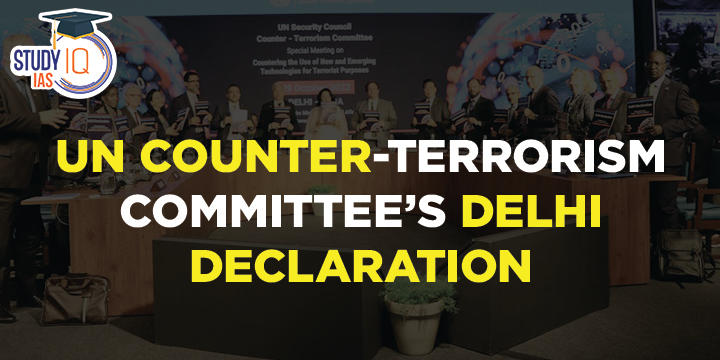Table of Contents
UN Counter Terrorism Committee Highlights of the Meeting
- The focus areas of meeting was the use of the internet and social media, terrorismfinancing and new payment mechanism, and unmanned aerial systems (UAS), including drones, for terrorist activities.
- The observations of the Indian foreign minister on use of new technologyare re-shaping global terrorism formed the basis of the Delhi declaration which focused on countering the use of new and emerging technologies for terrorist purposes.
- Voluntary contribution: The minister said that India would voluntarily contribute $0.5 million to the UN Trust Fund for Counter Terrorism this year for enhancing the efforts of the UN Office of Counterterrorism (UNOCT) and provide capacity-building support to member states.
- The meeting also hailed the role of Tech Against Terrorism initiative and the industry-led Global Internet Forum to Counter Terrorism (GIFCT) initiatives for taking steps to act against terror activities.
UN Counter Terrorism Committee Highlights of Delhi Declaration:
- Non-justification of terrorism: Terrorism in all forms and manifestations is one of the major threats. Any acts of terrorism are criminal and unjustifiable, regardless of their motivations, whenever, wherever and by whomsoever committed.
- Zero tolerance: Zero tolerance towards terrorist activities through full and effective implementation of UN Security Council resolutions.
- Member states will fulfill their obligations enshrined in relevant international counter terrorism conventions.
- Obligations of member states: Member states are obliged to prevent and suppress terror financing and to refrain from providing support to entities or persons involved in such acts.
- This includes suppressing recruitment of members of terrorist groups, consistent with international laws, and eliminating the supply of weapons to terrorists.
- Global cooperation: Terrorists’ opportunity to access safe havens is a major concern. All member states must cooperate in the fight against terrorism to identify safe havens and deny terrorists’ access.
- Any person who supports, facilitates, participates or attempts to participate in the financing, planning, preparation or commission of terrorist acts, including by providing safe havens, will have to be brought to justice, in accordance with domestic and international laws.
UN Security Council’s Counter Terrorism Committee (UNSC-CTC)
- UNSC-CTC was established by Security Council resolution 1373, adopted unanimously in 2001 after the 9/11 terror attacks in the US.
- Structure: The committee comprises of all 15 members of the UNSC. This includes 5 permanent and 10 non-permanent members of UNSC.
- Functions: The committee monitors implementation of resolution 1373that mandates countries to implement a number of measures to enhance their legal and institutional ability to counter terrorist activities at home and around the world.
- Other functions include:
- Criminalizing terror financing
- Freezing any funds of persons involved in acts of terrorism. Denying all forms of financial support for terrorist groups
- Suppressing safe haven, sustenance or support for terrorist activists
- Sharing information with other governments on any groups planning terrorist acts.
- For the first time ever, India hosted the UN Security Council’s Counter-Terrorism Committee (CTC) meeting at Mumbai and Delhi.
Tech Against Terrorism Initiative:
- It is an initiative launched and supported by the UN Counter Terrorism Executive Directorate (UN CTED) collaborating with the global tech industry to tackle terrorist use of the internet whilst respecting human rights.
- The initiative promotes constructive working relationships between the tech and government sectors, and organises global workshops and e-learning sessions for tech companies.
Global Internet Forum to Counter Terrorism (GIFCT):
- GIFCT is an NGO that brings together the technology industry, government, civil society, and academia to ensure collaboration and information-sharing tocounter terrorist activities.
- It was founded by Facebook, Microsoft, Twitter, and YouTube in 2017.
- Their main mandate is to prevent terrorists and violent extremists from exploiting digital platforms.





















 WhatsApp
WhatsApp